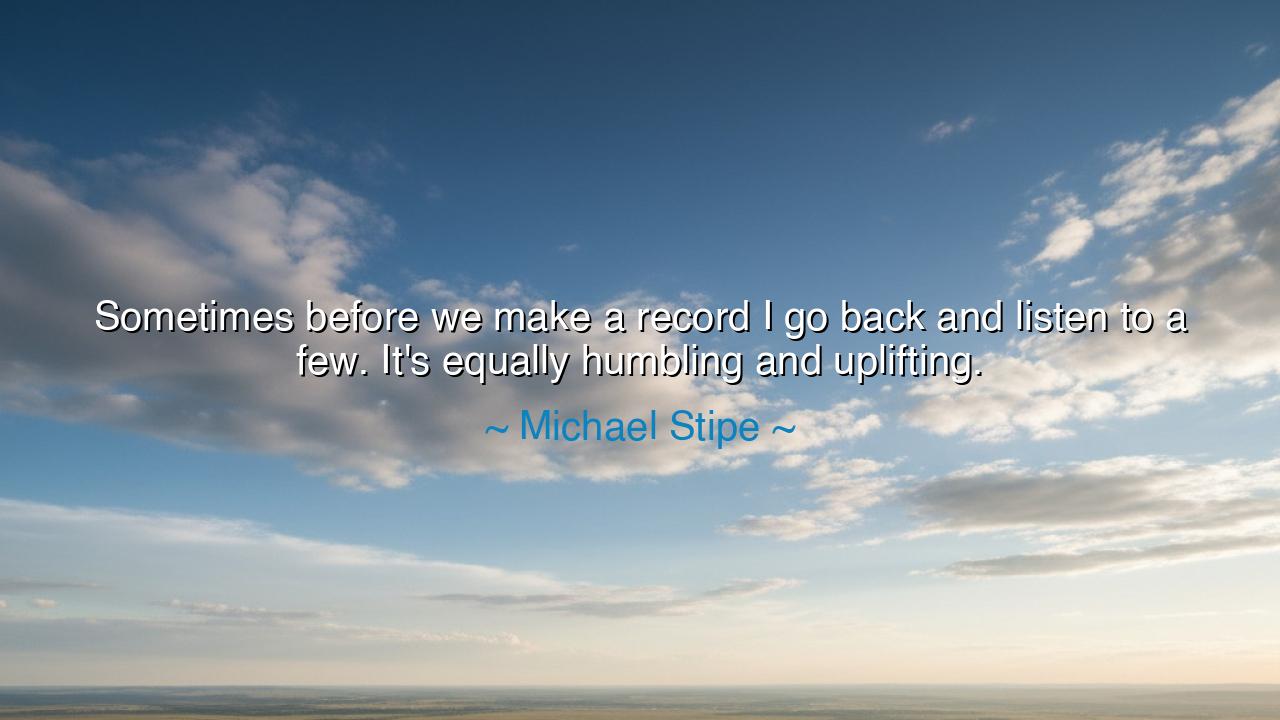
Sometimes before we make a record I go back and listen to a few.
Sometimes before we make a record I go back and listen to a few. It's equally humbling and uplifting.






Hear, O seeker of wisdom, the words of Michael Stipe, poet of song and voice of a generation: “Sometimes before we make a record I go back and listen to a few. It’s equally humbling and uplifting.” This saying, though rooted in the craft of music, speaks to all who create, strive, or dream. It reveals the dual power of reflection—that in looking back upon what we have done, we find both humility for our imperfections and strength from the heights we have already climbed.
The first truth lies in the act of looking back. Stipe does not rush blindly into new creation; he pauses, listens, remembers. To reflect upon past work is to stand in the presence of one’s own journey. There, the artist encounters both the flaws that still wound the ear and the moments of beauty that endure. This act is not nostalgia—it is discipline. For by knowing where one has been, one gains clarity about where to go next.
And he says: “It’s equally humbling and uplifting.” Humbling, because reflection reminds us of our limits. Even the greatest artist, when hearing his past work, discovers places where the voice was unsure, the vision incomplete, the mastery not yet attained. Uplifting, because those same works stand as monuments to effort, courage, and the miracle of creation. The past whispers: You have grown. You have overcome. You are capable of more. Thus, humility keeps pride from devouring the soul, and uplift keeps despair from paralyzing it.
History gives us a noble mirror of this truth. Consider Leonardo da Vinci, who often revisited his own sketches and paintings. He left many works unfinished, not from failure, but from the humility of knowing they did not yet match the vision in his mind. Yet he also drew strength from them, for each sketch, each study, showed progress in his hand. His greatness lay not only in creation, but in reflection—being both chastened by his flaws and inspired by his growth.
So too with athletes, who watch their past games to learn and improve. When Jesse Owens prepared for greatness at the 1936 Olympics, he reflected upon his earlier races. There, he saw mistakes that humbled him, but also victories that lifted him. By embracing both, he refined his stride and strengthened his spirit, until he shattered records before the eyes of the world. Reflection, then, is the crucible where humility and hope are forged together.
The lesson is clear: reflection is the key to growth. If you look only forward, you stumble blindly. If you look only back, you are trapped in regret or pride. But if you look back with humility and uplift, as Stipe teaches, then you draw from the past both warning and encouragement, and step into the future with balance.
Practical wisdom follows: before beginning a new task—be it work, art, or life’s next chapter—pause to reflect. Review what you have done. Note your mistakes without despair, and cherish your victories without arrogance. Let humility ground you, and let uplift carry you. This rhythm of reflection will sharpen your vision and steady your hand.
Thus, remember the words of Michael Stipe: “Sometimes before we make a record I go back and listen to a few. It’s equally humbling and uplifting.” This is not only the way of the musician, but of all who strive. Look back with honesty, look forward with courage, and let your life’s record be written with both humility and hope.






AAdministratorAdministrator
Welcome, honored guests. Please leave a comment, we will respond soon